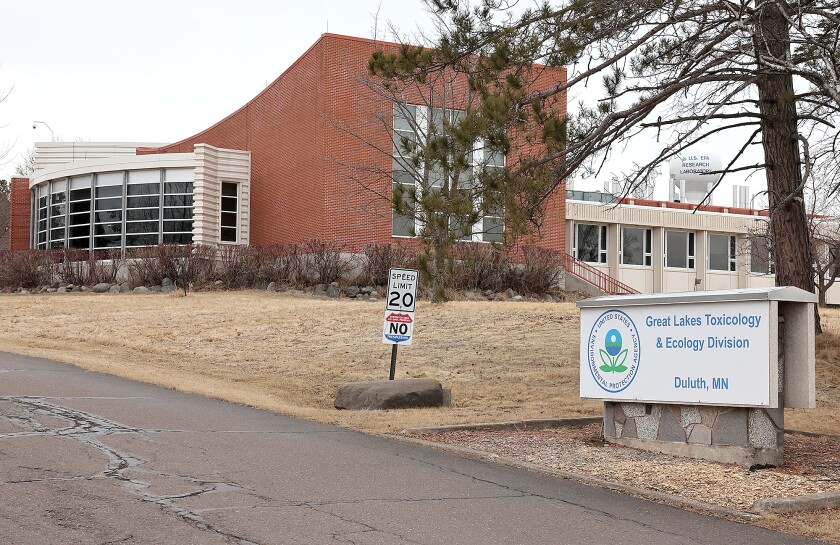HIBBING — Cleveland-Cliffs plans to temporarily idle two of its Iron Range mines and pellet plants and lay off 630 workers.
The iron ore mining and steel-making company said it would idle its Minorca Mine in Virginia and "partially idle" Hibbing Taconite in Hibbing, Cliffs spokesperson Pat Persico said in a statement Thursday morning.
"These temporary idles are necessary to re-balance working capital needs and consume excess pellet inventory produced in 2024," Persico said. "630 employees will be impacted following the completion of the 60-day WARN (Worker Adjustment and Retraining Notification) period. We remain committed to supporting our employees and communities while monitoring market conditions."
The Worker Adjustment and Retraining Notification Act requires employers with more than 100 employees to give a 60-day notice to workers if a plant is closing or a layoff affects 50 or more employees.
Earlier in the day, state Sen. Grant Hauschild, D-Hermantown, said in a news release that in addition to excess pellets, the automotive industry, which Cliffs supplies with steel, faces a downturn. Hauschild said 340 employees would be laid off from Minorca and 250 would be laid off from Hibtac; However, that total is 40 employees short of the total provided by Cliffs.
"(Hauschild) is told that temporary idles, and layoffs are necessary to re-balance working capital needs and consume excess pellet inventory produced in 2024," Hauschild's office said. "The automobile industry is facing one of the most challenging economic conditions in recent history and the Iron Range supplies much of the pellets necessary for that industry."
The Trump administration has imposed, then delayed, 25% tariffs on goods from Canada and Mexico. The levies, expected to take effect April 2, could drive up the price of vehicles and disrupt the industry's cross-border supply chains.
Auto dealers and the United Auto Dealers are bracing for layoffs thanks to the trade war, the Detroit Free Press reported Wednesday.
Cliffs mines and processes iron ore in Northeastern Minnesota and Michigan's Upper Peninsula and ships its iron to its steel mills further down the Great Lakes. The auto industry buys a significant portion of its steel.
ADVERTISEMENT
Al King, president of United Steelworkers Local 6115, which represents Minorca employees, said mining operations stopped Thursday morning.
King said the demand for pellets has not kept up with production, especially since Cliffs took a Cleveland blast furnace offline in the fall. It is still idled.
"We've finally run out of stockpile space for all of our pellets," said King, who is also a crusher control room operator at Minorca.
King, who said he'll be watching for the Cleveland blast furnace to come back online, is hopeful the automotive industry will pick back up after the initial pain of tariffs ends and the industry relies more on U.S.-made steel and supply chains.
Tony Barrett, emeritus professor of economics for the College of St. Scholastica in Duluth, said that could happen later in the year or early next year.
The Trump administration also put 25% tariffs on all imports of steel.
"Eventually, the steel industry in the United States will be protected and that will be good for the Iron Range," Barrett said.
ADVERTISEMENT
But it will take time.
In the meantime, the car manufacturers are still down. Since the North American Free Trade Agreement took effect 31 years ago, the U.S. automotive industry has been heavily dependent on supply chains that go back and forth over the borders with Canada and Mexico, and factories have been built in each country. Tariffs hit every time something crosses a border, driving up its price.
"The auto industry is uniquely positioned to be hurt by the tariffs on Mexican and Canadian products," Barrett said.
And when a car is built, it needs to be new, not recycled, steel. So when the car industry suffers, the Iron Range, especially Cliffs, follows.
But, Barrett said, the automotive industry is transitioning to domestic supply chains now that it seems the Trump administration's tariffs aren't just negotiating tactics.
"I see no reason to think these mines aren't going to reopen," Barrett said.
In a statement, U.S. Sen. Amy Klobuchar, D-Minn., said she had spoken with Cliffs CEO Lourenco Goncalves, who "pledged to do everything he can to make sure this is temporary and return miners to work when markets improve.”
ADVERTISEMENT
In the meantime, King said Cliffs told the union it would honor the 60-day WARN notice even though mining operations stopped immediately. While many of the 340 affected employees will help button up and shut down the mine and pellet plant, some may be paid to stay at home until May 20.
The laid-off miners can then file for unemployment benefits that typically last six months, but the Minnesota Legislature has previously extended the benefit to miners if a facility's idling lasts longer.
King said Hauschild assured him Thursday that the Legislature would work on extended benefits.
In a statement, state Rep. Cal Warwas, R-Clinton Township, said he and other lawmakers on the Iron Range delegation were drafting a bill on that.
"In the event of a longer-term layoff, Rangers need to know that we in the Iron Range Delegation are already working on a bill for extended unemployment to keep our skilled workforce on the Range," Warwas, whose district includes Minorca, said in a news release.
“This is tough news today," state Sen. Robert Farnsworth, R-Hibbing, said in a news release. "I have been in touch with Cleveland Cliffs leadership as well as union officials, and we are working together to take care of the employees and their families.
This story was updated several times with additional quotes and information. The final version was published at 6:30 p.m. March 20. It was originally posted at 11:04 a.m. March 20.











